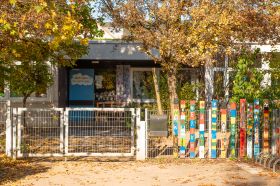Specifics
Basic pedagogical approach
Our basic pedagogical attitude is made up of the following building blocks. Our image of the child, our pedagogical approach, our role as pedagogical professionals, the importance of play and learning, child participation to safeguard children's rights, child participation, parent participation and integration/inclusion. You can find out what lies behind this large number of important headings and how we want to fill them with life in the following paragraph.
Our image of the child
I can grow where
where someone is waiting for me with joy
where I am allowed to make mistakes
where I have room to dream
Where I can stretch out my feet
Where I am stroked
Where I can talk straight
Where I can sing out loud
Where there is always a place for me
Where I can walk around without a mask
Where someone listens to my worries
Where I can be quiet
Where I am taken seriously
Where someone shares my joy
Where I am allowed to do nothing
Where I am comforted in my suffering
Where I can put down roots
Where I can live!
(source unknown)
Pedagogical approach
Our educational work is based on the situational approach. The starting point for our work is the life situation of the children and their very different circumstances. We ask ourselves what a child wants and needs. We observe their behavior, what they are currently doing, what they are interested in and what they are coping with well or less well. Our aim is to teach children the skills they need to master current and future life situations. We meet the children where they are with their strengths and weaknesses. We tend to focus on their strengths. We use a child's strengths to counterbalance their weaknesses. As educators, we are the child's partner and companion in this educational process. Together with the child, we want to quench their thirst for knowledge and support them by helping them to find their own answers to their questions. We make our experience and knowledge available to the child and provide the necessary support.
Our room design and our choice of materials are highly stimulating in order to offer children a wide range of experiences.
Play is an essential element of situation-based work. Through activities, projects and stimuli, children acquire new knowledge and experiences that they can process through play. Our aim is to promote the child holistically. In particular, we want to promote the children's social behavior, self-esteem and self-confidence. In order to achieve these goals, our daily routine is geared towards the children's interests and leaves room for spontaneous situations. We don't want to be "rushed" through the day with too many fixed activities and always consciously reflect on whether changes are necessary. The content of our work is based on the Baden- Württemberg orientation plan.




